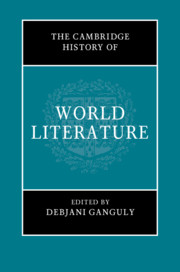Book contents
- The Cambridge History of World Literature
- The Cambridge History of World Literature
- Copyright page
- Contents
- Figures
- Contributors
- Acknowledgements
- Introduction
- Part I Genealogies
- Part II Thinking the World
- Part III Transregional Worlding
- Part IV Cartographic Shifts
- Part V World Literature and Translation
- Part VI Poetics, Genre, Intermediality
- 31 Poetry, (Un)Translatability, and World Literature
- 32 The Reinvention of the Novel in Africa
- 33 The Return of Realism in the World Novel
- 34 The Graphic Novel as an Intermedial Form
- 35 World Children’s Literature
- Part VII Scales, Polysystems, Canons
- Part VIII Modes of Reading and Circulation
- Part IX The Worldly and the Planetary
- Index
- References
33 - The Return of Realism in the World Novel
from Part VI - Poetics, Genre, Intermediality
Published online by Cambridge University Press: 17 August 2021
- The Cambridge History of World Literature
- The Cambridge History of World Literature
- Copyright page
- Contents
- Figures
- Contributors
- Acknowledgements
- Introduction
- Part I Genealogies
- Part II Thinking the World
- Part III Transregional Worlding
- Part IV Cartographic Shifts
- Part V World Literature and Translation
- Part VI Poetics, Genre, Intermediality
- 31 Poetry, (Un)Translatability, and World Literature
- 32 The Reinvention of the Novel in Africa
- 33 The Return of Realism in the World Novel
- 34 The Graphic Novel as an Intermedial Form
- 35 World Children’s Literature
- Part VII Scales, Polysystems, Canons
- Part VIII Modes of Reading and Circulation
- Part IX The Worldly and the Planetary
- Index
- References
Summary
Realism has occupied an ambivalent place in the career of the novel through the twentieth century. After its heyday in the nineteenth century, realism was abandoned by many literary movements—most famously Anglo-American modernism and Latin-American magical realism. This chapter argues that realism has made a comeback in contemporary times through a postcolonial allegorical appropriation of the novel where realism functions to critique literal and epistemic violence and project alternative worlds. Contemporary world realism arises from a nexus of ethical, epistemological and aesthetic concerns that position the novel as a space for reasoned reflection on the traumatic emergence of the contemporary world system. The chapter explores the implicit historicism of world realist aesthetics and novelists’ engagement with conflicts about historical process, world-systems, and temporality shaping debates in world literature today.
- Type
- Chapter
- Information
- The Cambridge History of World Literature , pp. 636 - 652Publisher: Cambridge University PressPrint publication year: 2021



